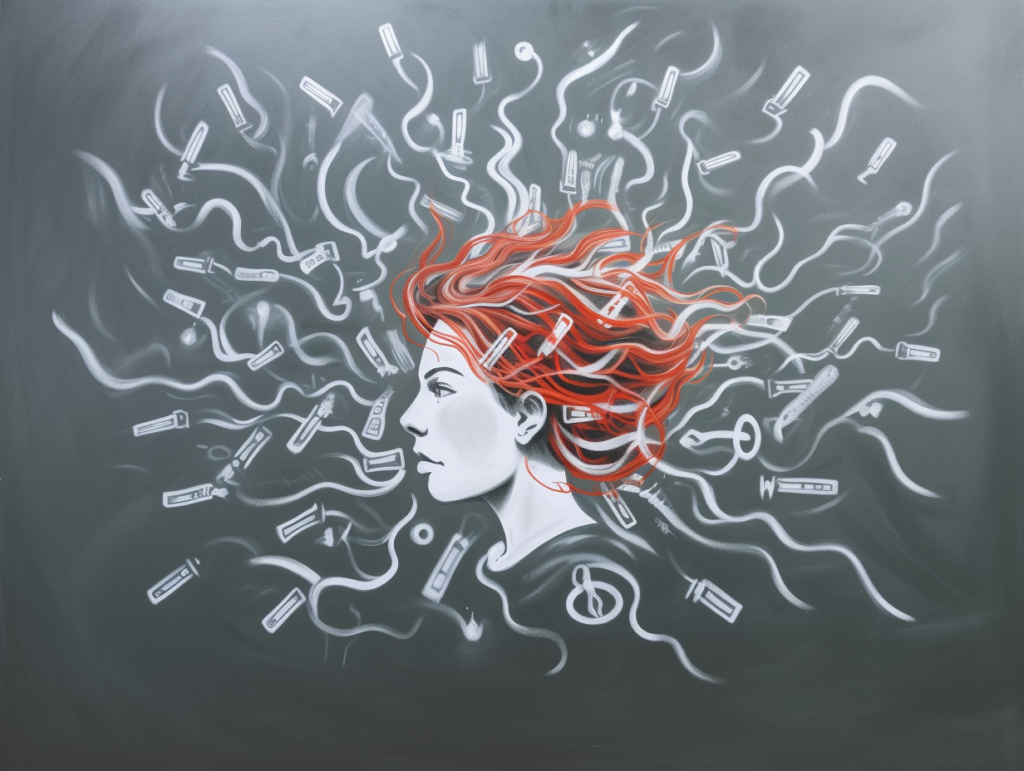ADHD Support Services
New ADHD Therapy Group starting called Enlightened ADHD. This will be a weekly group will rolling admission in 2024 and official starting of curriculum in January. Cost is $25 per session out of pocket, and most insurance providers cover Group counseling.
For more information email laural@newperceptionscounseling.net or to start the sign-up process, you can follow think link directly:
Sign up for Enlightened ADHD

Understanding ADHD
Attention-Deficit/Hyperactivity Disorder (ADHD) is a neurological condition characterized by a pattern of inattention, hyperactivity, and impulsivity that affects daily functioning and development. Recognizing the signs and symptoms of ADHD is crucial for getting the appropriate support.
Common Symptoms of ADHD
(referencing the DSM5-TR Diagnosing term)
These are the literal diagnosis criteria, see section below for examples… yes, some of the wording is problematic so see the What this looks like section as well.
Inattention
- Difficulty sustaining attention in tasks you are responsible for or enjoy doing
- Often does not respond to verbal communication ‘seeming to not pay attention’
- Struggles with organization and meeting deadlines
- Frequently loses necessary items (e.g., keys, paperwork, eyeglasses)
- Easily distracted by extraneous stimuli or bodily sensory stimuli
Hyperactivity and Impulsivity
- Fidgeting, tapping hands or feet, stimming or squirming/bouncing in seat (this includes fidgeting with nails, hair, face, clothes)
- Often leaves seat in situations when remaining seated is expected (i.e. when sitting in a long meeting one might struggle with sitting still and prefer to stand in the back or side of the room instead of sit)
- Feels restless or often acts as if “driven by a motor”
- Talks excessively/quickly and has difficulty waiting in social turn-taking or ‘line’ situations
What this looks / sounds / feels like
The Struggles
- Difficulty focusing: “I can’t concentrate on tasks for long periods,” or “My mind keeps wandering.”
- Easily distracted: “I get distracted by the smallest things,” or “I start one task but quickly move to another without finishing.”
- Forgetfulness: “I forget things easily, even important tasks or details,” or “I walk into a room and forget why I’m there.”
- Restlessness: “I feel like I always need to be moving or fidgeting,” or “I can’t sit still for long periods.”
- Procrastination: “I wait until the last minute to get things done,” or “I struggle to start tasks even when I know they’re important.”
- Hyperfocus: “Sometimes I get so absorbed in one thing that I lose track of time,” or “When I’m really into something, it’s hard to stop.”
- Impulsivity: “I act before I think,” or “I make decisions quickly without considering the consequences.”
- Disorganization: “My workspace or living space is always cluttered,” or “I struggle to keep track of things and plan ahead.”
- Time blindness: “I have no sense of how long something will take,” or “I’m often late because I underestimate time.”
- Feeling overwhelmed: “I often feel overwhelmed by simple tasks,” or “When there’s too much to do, I shut down.”
- Mood swings: “My emotions change rapidly,” or “I get frustrated easily when things don’t go my way.”
- Talking excessively: “I interrupt others without meaning to,” or “I start talking and forget to stop.”
- Trouble following instructions: “I struggle to follow step-by-step instructions,” or “It’s hard to complete a task if I don’t see the whole picture.”
- Sensitivity to criticism: “I take criticism really hard,” or “Even small critiques feel like big failures.”
- Constantly seeking stimulation: “I need something to keep me entertained all the time,” or “I get bored easily if things aren’t exciting.”
The Joys
- Hyperfocus: “When I’m passionate about something, I can get so deeply focused that I achieve a lot in a short time.” This intense concentration on tasks that are interesting or exciting can lead to highly productive work.
- Creativity: “I have a unique way of thinking and coming up with creative solutions to problems.” Many people with ADHD report having a strong ability to think outside the box, leading to innovative ideas.
- High energy: “I have a lot of energy, which helps me get through long or tough tasks.” This can make people with ADHD dynamic and enthusiastic, especially when engaged in something they enjoy.
- Spontaneity and adaptability: “I’m open to change and love trying new things.” The impulsivity associated with ADHD can lead to a willingness to take risks, explore new opportunities, and adapt quickly to changing situations.
- Curiosity: “I’m constantly interested in learning new things.” The tendency to get bored easily can also mean that people with ADHD are always seeking out new experiences and knowledge.
- Multitasking ability: “I can juggle several tasks at once.” Some people feel that their brain’s rapid-fire thinking allows them to handle multiple activities at the same time (although this can also be a challenge for others).
- Resilience: “I’ve had to develop problem-solving skills to overcome challenges, so I’m more resilient.” Many with ADHD become skilled at managing setbacks and developing coping strategies, making them stronger in the long run.
- Strong intuition: “I often trust my gut, and it tends to lead me in the right direction.” People with ADHD often describe having a keen sense of intuition, allowing them to make quick decisions based on instinct.
- Humor and playfulness: “I can make others laugh, even in stressful situations.” Many individuals with ADHD have a playful, lighthearted outlook, which can create a fun and positive atmosphere for those around them.
- Passion and enthusiasm: “When I love something, I put my whole heart into it.” People with ADHD can be extremely passionate, throwing themselves wholeheartedly into hobbies, causes, or projects they care about.
- Improvisation skills: “I’m good at thinking on my feet and coming up with quick solutions.” The impulsivity that can sometimes create challenges also enables people with ADHD to think quickly in dynamic or uncertain situations.
- Empathy: “I’m sensitive to other people’s emotions and can connect with them on a deep level.” Many people with ADHD are highly empathetic, which can help them build strong relationships.
- Persistence: “I don’t give up easily, even when things are hard.” Many with ADHD develop a strong sense of determination, having had to navigate challenges throughout their lives.
- Sense of adventure: “I love exploring and trying new things—it makes life exciting!” The constant need for stimulation can lead to a life full of diverse experiences and adventure.
- Flexibility in thinking: “I see connections between things that others might not notice.” ADHD often fosters a nonlinear, divergent way of thinking, which can lead to unique insights or problem-solving approaches.
How Therapy Can Help
ADHD adults can benefit greatly from various forms of therapy, including individual counseling, family or parental therapy, and group therapy. Each type of support helps them develop different skills and coping strategies to manage the challenges of ADHD.
Overall Life Changes from Mental Health Support
By engaging in individual, family, and group therapy, adults with ADHD often experience significant positive changes in their daily lives, including:
- Better organization and productivity: Learning practical skills that help them stay on top of tasks at work or home.
- Improved relationships: More effective communication with family members, partners, and colleagues, leading to healthier, more supportive interactions.
- Increased self-awareness: Understanding how ADHD affects their life and developing self-compassion, which can reduce negative self-talk and feelings of inadequacy.
- Higher self-esteem and confidence: As they learn to manage symptoms, they feel more in control and capable, improving their overall sense of well-being.
- Reduced anxiety and depression: Addressing the emotional aspects of ADHD, such as frustration or overwhelm, often improves mental health outcomes.
- Greater life satisfaction: With the right support, adults with ADHD can lead fulfilling, productive lives that leverage their strengths and minimize challenges.
These therapies offer long-term tools and perspectives that help individuals manage their ADHD in a way that enhances their quality of life.
Here’s a breakdown of how these therapies can help, what skills they may learn, and how their lives can change:
- Individual Counseling
What it offers: Individual counseling provides one-on-one support tailored to the person’s unique needs. Cognitive-behavioral therapy (CBT) is commonly used for ADHD, helping adults address thought patterns and behaviors that contribute to their challenges.
Skills learned:
- Time management: Strategies for breaking tasks into smaller steps, using calendars or reminders, and creating routines.
- Emotional regulation: Techniques to manage frustration, impulsive reactions, and mood swings.
- Impulse control: Mindfulness practices or grounding techniques to pause before acting impulsively.
- Self-esteem building: Addressing negative self-perceptions and building confidence in one’s strengths and abilities.
- Focus and attention improvement: Developing skills for sustained attention and reducing distractions.
- Stress management: Relaxation techniques, such as deep breathing or progressive muscle relaxation.
Life changes:
- Improved ability to complete tasks and meet deadlines.
- Reduced anxiety and frustration related to ADHD symptoms.
- Greater emotional balance, leading to healthier relationships.
- Increased confidence in handling everyday challenges.
- More structured and productive daily routines.
- Family and Parental/Couples Therapy
What it offers: ADHD often affects not just the individual, but the entire family dynamic. Family and parental therapy helps family members understand ADHD, communicate better, and build a more supportive home environment.
Skills learned:
- Improved communication: Techniques for clear, non-confrontational communication, reducing misunderstandings and conflicts.
- Setting boundaries and expectations: Developing fair, consistent rules around behavior and responsibilities within the family.
- Emotional support strategies: Helping family members provide empathy and understanding without enabling negative behaviors.
- Problem-solving as a team: Collaborating to address ADHD-related issues, like forgetfulness or disorganization, and finding solutions together.
- Parenting techniques for ADHD: For those with ADHD children, learning specialized parenting approaches that promote structure, consistency, and positive reinforcement.
Life changes:
- Reduced family conflict, with more harmonious relationships.
- A greater sense of empathy and understanding within the family.
- Clearer expectations and routines that help everyone function more smoothly.
- Family members feel more equipped to support the ADHD individual rather than feeling frustrated or helpless.
- Group Therapy (please link this heading to the ADHD Groups page on website)
What it offers: Group therapy allows individuals with ADHD to connect with others who face similar challenges. It provides a safe space to share experiences, offer mutual support, and learn strategies from both a therapist and peers.
Skills learned:
- Social skills development: Practice in active listening, turn-taking in conversations, and reading social cues.
- Peer support and accountability: Sharing personal strategies that work, learning from others’ successes and setbacks, and feeling less isolated.
- Managing shame and stigma: Gaining perspective on the shared experience of ADHD and reducing the feelings of shame or embarrassment that often accompany the diagnosis.
- Problem-solving through discussion: Learning creative solutions from others and brainstorming together to tackle common ADHD-related challenges.
- Building community and connection: Overcoming social anxiety by practicing interacting with others in a structured, supportive environment.
Life changes:
- Reduced sense of isolation and increased social connections with people who understand ADHD.
- Greater self-acceptance, feeling more confident in one’s identity and experiences.
- Learning new strategies and coping mechanisms from peers, leading to more effective ADHD management.
- Improved social relationships, both in the group and in everyday life, through better communication and empathy skills.
When to Seek Help
ADHD brains encounter and live in the world a bit differently. Sometimes this means our homes and workplaces need to embrace us in order to reduce life frustrations and struggles. Often individuals find they need adjustments made at home or at work through accommodation, shifted expectations, or flexible parameters; doing so increases quality of life as well as self-confidence and efficiency.
QUESTIONS?
Whether you’re curious about therapy methods, a consultation session, or even our counseling approach, we’re here to address any inquiries you may have.
